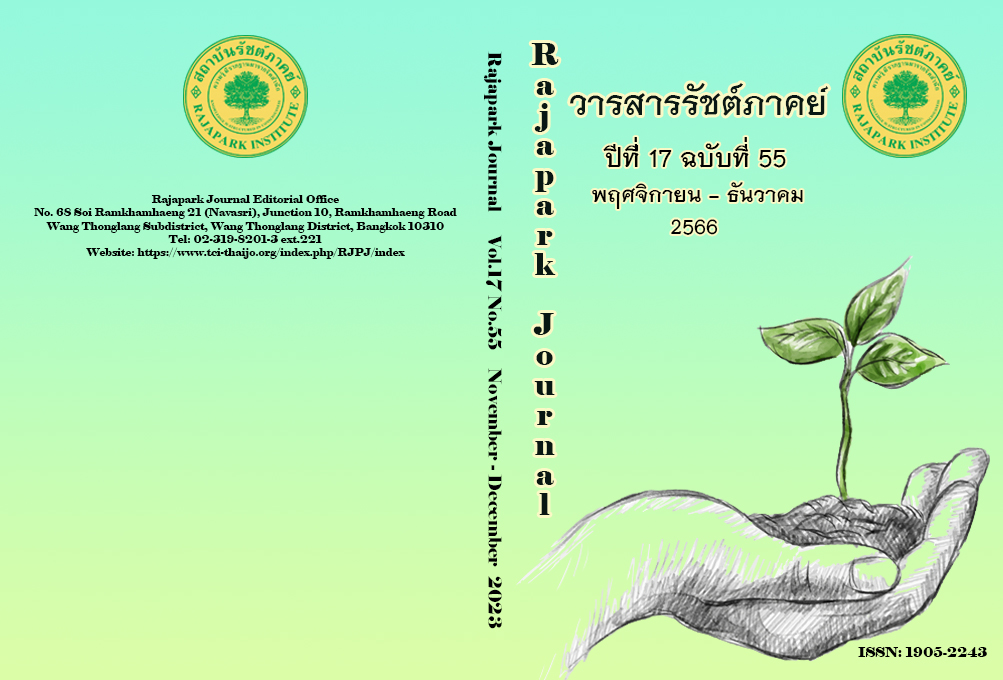The Development of Teacher Professional Training Experience Supervision of Students in a Dual-Bachelor Degree Program, University of Phayao
Main Article Content
Abstract
The objectives of this study were: 1) to study background information and supervision guidelines from the group of informants who were involved in the professional experience training of teachers; 2) to create a model through focus group discussions with experts. 3) to operationalize the model by teacher mentors and lecturer supervisors 4) deployed a teaching practicum report and satisfaction questionnaire for research instruments.The results showed that: 1) The demographic data and supervision guidelines revealed that students graduated with a degree in their major and a degree in education. Also, the supervision deployed a major discipline lecturer and an education lecturer. The supervision guidelines adhere to the foundation of teacher profession principles, uphold democratic principles to ensure that students meet professional standards, and utilize all input factors from all relevant sectors for preparation and implementation processes to offer outcomes that meet the standards prescribed by the Teacher's Council. 2) The model consists of 5 components covering principles, objectives, input factors, processes, and outcomes. The model's appropriateness was rated at the highest level. 3) The operationalization of the model showed that student teachers demonstrated skills and competence in teaching and learning management in their major discipline, overall at a high level. Also, their teacher characteristics before and after the teaching practicum showed a significant difference in their confidence level. 01. 4) For the supervision model evaluation, student teachers passed their teaching practicum evaluation at 98.97%. Also, teacher mentors and lecturer supervisors showed their satisfaction with the model, overall, at a high level.
Article Details

This work is licensed under a Creative Commons Attribution-NonCommercial-NoDerivatives 4.0 International License.
Views and opinions appearing in the Journal it is the responsibility of the author of the article, and does not constitute the view and responsibility of the editorial team.
References
Allen, I. E., Seaman, J., & Garrett, R. (2007). Blending In: The Extent and Promise of Blended Education in the United States. The Sloan Consortium: The United States of America.
Announcement of the Ministry of Education on the Standards for Bachelor's Degree Qualifications in Education (5-year Curriculum). (2019, March 6). Royal Gazette. Volume 136, Special Issue 56, Section 56.
Announcement of the Ministry of Education on the Guidelines for Dual-degree Administration for Undergraduate Programs in Thai Universities B.E. 2552. (2009, June 19). Royal Gazette. Volume 126, Special Issue 86, Section 86.
Arjinsamachan, C. (2007). New Teaching Supervision. Chongcharoen Printing.
Briggs, T.H., & Justman, J. (1952). Improving Instruction Through Supervision. Macmillan.
Burton, W.H., & Bruckner, L.J. (1955). Supervision: A Social Process (3rd ed.). Appleton.
Chaisen, M. (2019). Comparing Teacher Competency Development in Learning Management of Schools under Local Administrative Organization by Classroom Research Approach[Ph.D. Thesis in Research, Assessment and Educational Statistics, Burapha University].
Cohen, J.M., & Uphoff, N.T. (1981). Rural Development Participation: Concept and Measure for Project Design Implementation and Evaluation: Rural Development Committee Center for International Studies. Cornell University Press.
Educational Teaching Practicum Section. (2021). Evaluation Report on Teacher Professional Practicum. Graduate Program. School of Education, University of Phayao.
Kruekam-ai, W. (2019). The Development of Supervision Model for Field Experience Student Teachers to Improve Instructional Competency that Enhances Thinking Skills of Elementary School Students[Ph.D. Thesis in Curriculum and Instruction, Silpakorn University].
Laoriendee, W. (2017). Teaching Supervision. Curriculum and Supervision Program. Silpakorn Printing House.
Laoriendee, W. (2010). Teaching Techniques and Supervision. Nakhon Pathom. Project Promoting Textbook and Teaching Materials Production. Faculty of Education. Silpakorn University.
Nopparak, S. (2019). The Model for Teaching Practicum Administration Development: A Case Study of Dual-degree Teacher Education Program of the University of Phayao. The Golden Teak: Humanity and Social Science Journal (GTHT.), 24(2), 10-27.
Pajak, P. E. (1990). Identification of supervisory proficiency project. Althea, Georgia: Department of Curriculum and Supervision, University of Georgia.
Pargudtong, P. (2018). Development of Teacher Professional Characteristics of Student Teachers in the Faculty of Education Bansomdejchopraya Rajabhat University. STOU Education Journal, 1(11), 212-225.
Pimpok, K., Samuttai, R., Phuvipadawat, S., & Srisook, K. (2517). Model of Supervision Monitoring and Evaluation Capabilities in Research to Develop Teaching and Learning of Student Teachers. Journal of MCU Social Science Review, 6(3), 172–186. https://so03.tcithaijo.org/index.php/jssr/article/view/245661.
Satjapiboon, S. (2017). The Development of a Teacher Professional Experience Supervision Model to Enhance Instructional Competency for Pre-service Teacher. Journal of Education Research. Faculty of Education. Srinakharinwirot University, 11(2), 177-192.
School of Education, University of Phayao. (2021). Handbook of Teacher Professional Practicum. School of Education, University of Phayao.
Srisuantaeng, S., & Traimonkolkul, P. (2014). Efficacy of Supervision System for Research-based Professional Internship at Schools for Five-year Program Agriculture Teachers. Kasetsart Journal (Social), 32, 265-276.
Stofle and Hamillton. (2008). Online Supervision for Social Workers. http://www.ocialworker.com /onlineesu.htm
Stokes, A. (2008). Supervision in Cyberspace. http://counselingatwork.org.uk/journal_pdf/acw_winter06_b.pdf.
Thammawithikul, A. (2009). Introduction to Educational Supervision. https://panchalee.wordpress.com/2009/03/30/supervision/
Teachers Council of Thailand. (2020). Documents for the Meeting Clarifying the Implementation of the Process of Promoting the Learning Community Process Professional Ethics to Develop Professional Ethics Through the Information Technology System (E-PLC) for the Year 2020. Teachers Council of Thailand.
The Teachers and Educational Personnel Council Act B.E. 2546. (2003, June 11). Royal Gazette. Volume 120, Special Issue 52.
University of Phayao. (2018). Announcement of the University of Phayao on the Guidelines for Dual-degree Teacher Education Program. University of Phayao.


